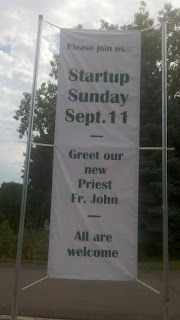 Psalms 18:1-20 * 18:21-50; 2 Samuel 23:13-17b; 2 John 1-13; John 2:1-11
Psalms 18:1-20 * 18:21-50; 2 Samuel 23:13-17b; 2 John 1-13; John 2:1-11The Gospel writer we call John has provided us with a work of art. This Gospel is structured, created, planned and arranged in such a manner so as to resemble a masterpiece painting. Each verse, each story, each interaction is a brush-stroke illuminating and creating a whole piece.
Today's brush work brings us to the story of Jesus attending a wedding in Cana, where his mother is present. She knows him so well, that he can seemingly brush her off rudely and yet she knows he will do what she asks. John begins this account with the phrase "on the third day"....a relatively important phrase in the life and ministry of Jesus. At the beginning of John's Gospel the importance of "the third day" is emphasized. John has framed the Gospel, at the beginning here and at the end, with the significance of this third day. An artful piece of craftsmanship.
But within that frame, we have a story of Jesus being so well known that he can brusquely cast off a suggestion from his beloved mother, and yet go and do this changing of water into wine, because he is so well known.....with John once again framing the importance of wine to the greater masterpiece he is painting....water into wine here, and wine into blood later.....
It is easy to get lost in these "frames", these bookends, John is creating for us. But there is an important metaphor in this story too. The "well-knowing" factor....Mary knows Jesus so well that she is confident that he will do the right thing even though he acts as if he will not. How often in life have we seen this play out? How often have we been the main character in this story, where we are asked to do something, or we know we must do something, act childishly about performing whatever that task is, and then, when no one is looking, go ahead and do it...... We are known so well...... God knows us so well that we are given the gift of Jesus to remind us of that which we already know.....we are to build this kingdom here and now.....we are to work night and day in making it so......and although we may be quarrelsome about doing so, we are known by God so very well, that there is a confidence-building-quality to this relationship that we can and will do the right thing when faced with the challenges in life.
On the third day.....water and wine.....being so well known and loved......Some good things to think on as we approach the end of our secular year.
jfd+
Copyright 2011, The Rev. John F. Dwyer. All Rights Reserved.
Photo; The 35W Bridge, 2011, jfd+


























